سجن ابو غريب صورفادحة للتعذيب الدموي ضد المجاهدين المسلمين :
مجموعة 2 :
الشيخ محمد حسني البيومي
الهاشمي
سلسلة تفضح الصورة النازية للتعذيب الصهيوني الأمريكي الأعرابي في السجون العالمية
المجموعة الثانية
السادية البوشوية وأصول النزعات التلمودية المتحكمة في الأنموذج
الدموي
التلمودي والسادي الذي يتحكم بالعقل الأمريكي وسياسات التعذيب الإجرامية …
ونساء يتلذذن بالتعذي في أتون بوليس الدجال الملعون والذي يتحكم بالعقل
الجريمي في حكومة واشنطن النازية … في دولة البغي والعدوان التي لا زالت
ترفع شعار تمثال الحرية في قلب العاصمة التلمودية في واشنطن … وأي توجه
معادي للحق الانساني مع سجناء الحرية والجهاد والمقاومة لنيل حقوقهم في
بلادهم …
شاهدون بسلاحهم المقاوم على كل أشكال التمرد الماسوني الذي يتحكم بسياسات النهب الدموي لأميركا النازية …
هذه
صور نقتطفها من الإعلام لتبيان فداحة الممارسات المعادية للحق الانساني
والنزعة الانسانية الدموية في العقل الأعرابي النظامي والذي يحيط اليوم
بالأرض المقدسة شاهدا على التحريف الوثني الاسرائيلي في الانجيل والتوراة …
نحو تأصيل الفكر الدموي الباطش …
والذي يصف الهنا القدوس بالاله المجرم
نحو تأصيل الفكر الدموي الباطش …
والذي يصف الهنا القدوس بالاله المجرم
والباطش والداعي للمجازر …
تعالى الله عما يقولون علوا كبيرا …
نماذج صور إضافية منقولة للتعذيب في سجن ابو غريب
اتصديرها لسجون غوانتينامو الدموية الاجرامية ...
اتصديرها لسجون غوانتينامو الدموية الاجرامية ...
| www.albasrah.net | |||
This page will be updated with pictures and articles
See bellow
| |||
| |||
 | |||
 | |||
 | |||
 | |||
 | |||
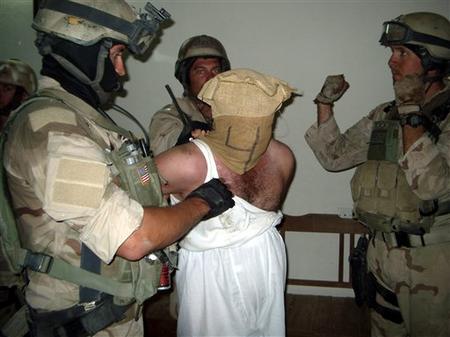 | |||
 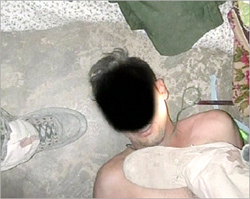 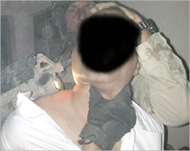 | |||
(AP Photo) 04/12/2004
| |||
The Abu Ghraib Prison Photos
It’s the "liberation" of the Iraqi people
These
are just some of the photos that led to an investigation into
conditions at the Abu Ghraib prison run by the occupation
authorities, as revealed in a shocking report broadcast by CBS on 60 Minutes II.
Images Copyright CBS News: Reprinted for Fair Use
| |||
 The Passion PowerPoint |  | ||
 |  | ||
and MICHAEL LEA | |||
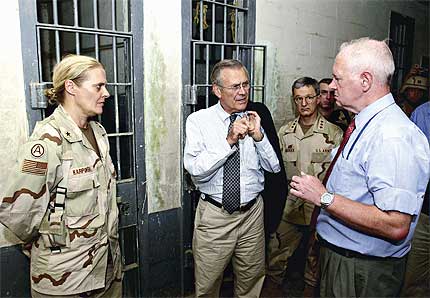 | |||
| Brigadier-General Janis Karpinski, who was responsible for military jails in Iraq | |||
 | |||
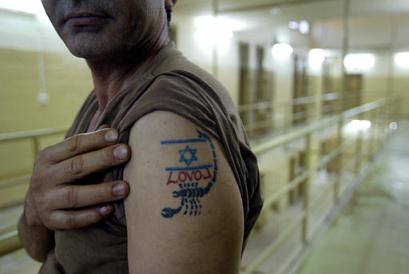
Inside Abu Ghraib
| |||
 | |||
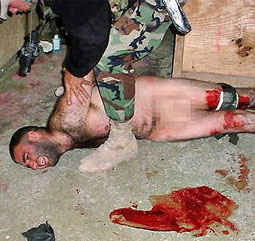 | |||
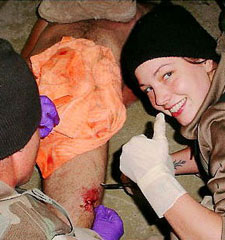 | |||
 | |||
 | |||
 | |||
 | |||
 | |||
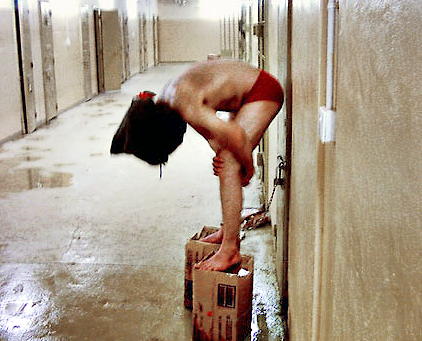 | |||
| Handcuffed in an awkward position, the prisoner's ankle cuffed to the door handle behind him | |||
| اليدان مربوطتان مع الركبه و الكاحل مربوط بالباب الخلفي ليجبر الضحيه على الوضع الظاهر | |||
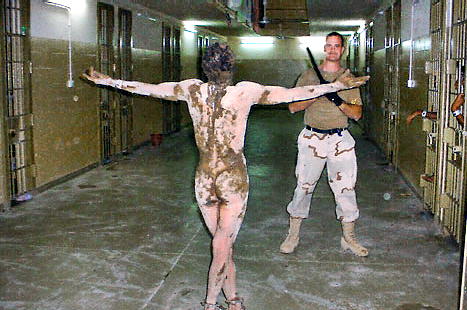 | |||
| Covered in a feces, Stool | |||
| الضحيه ملطخ بالبراز مقيد القدمين | |||
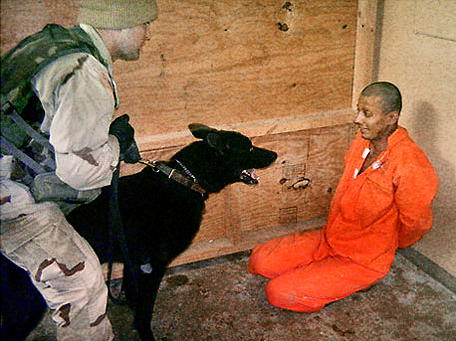 | |||
 | |||
 | |||
 | |||
| ضربه مميته على النخاع الشوكي في الرقبه | |||
 | |||
 | |||
 | |||
| Our Abu Ghraib? Former inmates at a Brooklyn detention center are suing the Justice Department on charges of abuse | |||
 | |||
| Even after death ! | |||
| ABC News has obtained two new photos taken at the Abu Ghraib prison in Iraq showing Spc. Charles Graner and Spc. Sabrina Harmon posing over the body of a detainee who was allegedly beaten to death by CIA or civilian interrogators in the prison's showers. The detainee's name was Manadel al-Jamadi. Mark Rothschild writes about the details of this poor man's death. | |||
 | |||
 | |||
 | |||
 | |||
| http://www.spiegel.de/politik/ausland/0,1518,299964,00.html | |||
 | |||
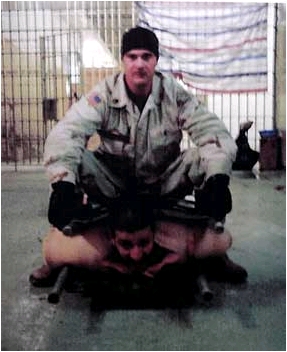 | |||
 | |||
 | |||
 | |||
 | |||
 | |||
 | |||
 | |||
 | |||
| Beaten to death | |||
 | |||
 | |||
 | |||
 | |||
 | |||
 | |||
 | |||
 | |||
 | |||
 | |||
 | |||
 | |||
 | |||
 | |||
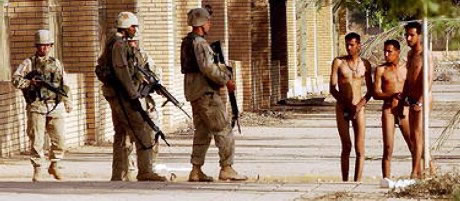 | |||
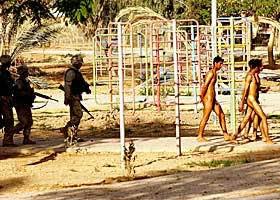 |  | ||
 | |||
| http://www.aztlan.net/iraqi_women_raped.htm | |||
| http://ctdsaddam.i8.com/uscrimes11.htm | |||
| http://www.carmillaonline.com/archives/2003/05/000221.html#000221 | |||
| The women prisoners: : The scandal at Abu Ghraib prison was first exposed not by a digital photograph but by a letter. | |||
| Flashbach :A message From an Iraqi female prisoner Translated by Dijla Waheed | |||
| Flashback: A DESPERATRE SCREAM FROM AN IRAQI LADY FROM HER PRISON Translated by Prof. Dr. Q. Al-Samarrai | |||
| سجين عراقي : جنود الاحتلال اغتصبوا فتاة امام والدها في ابو غريب http://www.albasrah.net/maqalat_mukhtara/arabic/0504/eqtisab_280504.htm Iraqi Women in the Occupation Prisons As Material and Means of Violations | |||
| شهادات عن اغتصاب العراقيات في سجن ابو غريب | |||
(CBS) Last
month, the U.S. Army announced 17 soldiers in Iraq, including a
brigadier general, had been removed from duty after charges of
mistreating Iraqi prisoners.
© MMIV, CBS Worldwide Inc. All Rights Reserved.But the details of what happened have been kept secret, until now. It turns out photographs surfaced showing American soldiers abusing and humiliating Iraqis being held at a prison near Baghdad. The Army investigated, and issued a scathing report. Now, an Army general and her command staff may face the end of long military careers. And six soldiers are facing court martial in Iraq -- and possible prison time. Correspondent Dan Rather talks to one of those soldiers. And, for the first time, 60 Minutes II will show some of the pictures that led to the Army investigation. According to the U.S. Army, one Iraqi prisoner was told to stand on a box with his head covered, wires attached to his hands. He was told that if he fell off the box, he would be electrocuted. It was this picture, and dozens of others, that prompted an investigation by the U.S. Army. On Tuesday, 60 Minutes II asked Brig. Gen. Mark Kimmitt, deputy director of coalition operations in Iraq, what went wrong. “Frankly, I think all of us are disappointed by the actions of the few,” says Kimmitt. “Every day, we love our soldiers, but frankly, some days we're not always proud of our soldiers." For decades under Saddam Hussein, many prisoners who were taken to the Abu Ghraib prison never came out. It was the centerpiece of Saddam’s empire of fear, and those prisoners who did make it out told nightmarish tales of torture beyond imagining – and executions without reason. 60 Minutes II talked about the prison and shared pictures of what Americans did there with two men who have extensive interrogation experience: Former Marine Lt. Col. Bill Cowan and former CIA Bureau Chief Bob Baer. "I visited Abu Ghraib a couple of days after it was liberated. It was the most awful sight I've ever seen. I said, ‘If there's ever a reason to get rid of Saddam Hussein, it's because of Abu Ghraib,'” says Baer. “There were bodies that were eaten by dogs, torture. You know, electrodes coming out of the walls. It was an awful place." "We went into Iraq to stop things like this from happening, and indeed, here they are happening under our tutelage,” says Cowan. It was American soldiers serving as military police at Abu Ghraib who took these pictures. The investigation started when one soldier got them from a friend, and gave them to his commanders. 60 Minutes II has a dozen of these pictures, and there are many more – pictures that show Americans, men and women in military uniforms, posing with naked Iraqi prisoners. There are shots of the prisoners stacked in a pyramid, one with a slur written on his skin in English. In some, the male prisoners are positioned to simulate sex with each other. And in most of the pictures, the Americans are laughing, posing, pointing, or giving the camera a thumbs-up. 60 Minutes II was only able to contact one of the soldiers facing charges. But the Army says they are all in Iraq, awaiting court martial. "What can the Army say specifically to Iraqis and others who are going to see this and take it personally," Rather asked Kimmitt, in an interview conducted by satellite from Baghdad. "The first thing I’d say is we’re appalled as well. These are our fellow soldiers. These are the people we work with every day, and they represent us. They wear the same uniform as us, and they let their fellow soldiers down,” says Kimmitt. “Our soldiers could be taken prisoner as well. And we expect our soldiers to be treated well by the adversary, by the enemy. And if we can't hold ourselves up as an example of how to treat people with dignity and respect … We can't ask that other nations to that to our soldiers as well." “So what would I tell the people of Iraq? This is wrong. This is reprehensible. But this is not representative of the 150,000 soldiers that are over here,” adds Kimmitt. “I'd say the same thing to the American people... Don't judge your army based on the actions of a few." One of the soldiers facing court martial is Army Reserve Staff Sgt. Chip Frederick. Frederick is charged with maltreatment for allegedly participating in and setting up a photo, and for posing in a photograph by sitting on top of a detainee. He is charged with an indecent act for observing one scene. He is also charged with assault for allegedly striking detainees – and ordering detainees to strike each other. 60 Minutes II talked with him by phone from Baghdad, where he is awaiting court martial. Frederick told us he will plead not guilty, claiming the way the Army was running the prison led to the abuse of prisoners. “We had no support, no training whatsoever. And I kept asking my chain of command for certain things...like rules and regulations,” says Frederick. “And it just wasn't happening." Six months before he faced a court martial, Frederick sent home a video diary of his trip across the country. Frederick, a reservist, said he was proud to serve in Iraq. He seemed particularly well-suited for the job at Abu Ghraib. He’s a corrections officer at a Virginia prison, whose warden described Frederick to us as “one of the best.” Frederick says Americans came into the prison: “We had military intelligence, we had all kinds of other government agencies, FBI, CIA ... All those that I didn't even know or recognize." Frederick's letters and email messages home also offer clues to problems at the prison. He wrote that he was helping the interrogators: "Military intelligence has encouraged and told us 'Great job.' " "They usually don't allow others to watch them interrogate. But since they like the way I run the prison, they have made an exception." "We help getting them to talk with the way we handle them. ... We've had a very high rate with our style of getting them to break. They usually end up breaking within hours." According to the Army’s own investigation, that’s what was happening. The Army found that interrogators asked reservists working in the prison to prepare the Iraqi detainees, physically and mentally, for questioning. What, if any actions, are being taken against the interrogators? "I hope the investigation is including not only the people who committed the crimes, but some of the people that might have encouraged these crimes as well,” says Kimmitt. “Because they certainly share some level of responsibility as well." But so far, none of the interrogators at Abu Ghraib are facing criminal charges. In fact, a number of them are civilians, and military law doesn’t apply to them. One of the civilian interrogators at Abu Ghraib was questioned by the Army, and he told investigators he had "broken several tables during interrogations, unintentionally," while trying to "fear up" prisoners. He denied hurting anyone. In our phone conversation, 60 Minutes II asked Frederick whether he had seen any prisoners beaten. “I saw things. We had to use force sometimes to get the inmates to cooperate, just like our rules of engagement said,” says Frederick. “We learned a little bit of Arabic, basic commands. And they didn't want to listen, so sometimes, you would just give them a little nudge or something like that just to get them to cooperate so we could get the mission accomplished." Attorney Gary Myers and a judge advocate in Iraq are defending Frederick. They say he should never have been charged, because of the failure of his commanders to provide proper training and standards. "The elixir of power, the elixir of believing that you're helping the CIA, for God's sake, when you're from a small town in Virginia, that's intoxicating,” says Myers. “And so, good guys sometimes do things believing that they are being of assistance and helping a just cause. ... And helping people they view as important." Frederick says he didn't see a copy of the Geneva Convention rules for handling prisoners of war until after he was charged. The Army investigation confirms that soldiers at Abu Ghraib were not trained at all in Geneva Convention rules. And most were reservists, part-time soldiers who didn't get the kind of specialized prisoner of war training given to regular Army members. Frederick also says there were far too few soldiers there for the number of prisoners: “There was, when I left, there was over 900. And there was only five soldiers, plus two non-commissioned officers, in charge for those 900 -- over 900 inmates." Rather asked Kimmitt about understaffing. "That doesn't condone individual acts of criminal behavior no matter how tired we are. No matter how stretched we are, that doesn't give us license and it doesn't give us the authority to break the law,” says Kimmitt. “That may have been a contributing factor, but at the end of the day, this is probably more about leadership, supervision, setting standards, abiding by the Army values and understanding what's right, and having the guts to say what's right.” Brig. Gen. Janice Karpinsky ran Abu Ghraib for the Army. She was also in charge of three other Army prison facilities that housed thousands of Iraqi inmates. The Army investigation determined that her lack of leadership and clear standards led to problems system wide. Karpinski talked with 60 Minutes’ Steve Kroft last October at Abu Ghraib, before any of this came out. "This is international standards,” said Karpinski. “It's the best care available in a prison facility." But the Army investigation found serious problems behind the scenes. The Army has photographs that show a detainee with wires attached to his genitals. Another shows a dog attacking an Iraqi prisoner. Frederick said that dogs were “used for intimidation factors.” Part of the Army's own investigation is a statement from an Iraqi detainee who charges a translator - hired to work at the prison - with raping a male juvenile prisoner: "They covered all the doors with sheets. I heard the screaming. ...and the female soldier was taking pictures." There is also a picture of an Iraqi man who appears to be dead -- and badly beaten. "It's reprehensible that anybody would be taking a picture of that situation,” says Kimmitt. But what about the situation itself? “I don't know the facts surrounding what caused the bruising and the bleeding,” says Kimmitt. “If that is also one of the charges being brought against the soldiers, that too is absolutely unacceptable and completely outside of what we expect of our soldiers and our guards at the prisons." Is there any indication that similar actions may have happened at other prisons? “I'd like to sit here and say that these are the only prisoner abuse cases that we're aware of, but we know that there have been some other ones since we've been here in Iraq,” says Kimmitt. When Saddam ran Abu Ghraib prison, Iraqis were too afraid to come ask for information on their family members. When 60 Minutes II was there last month, hundreds had gathered outside the gates, worried about what is going on inside. "We will be paid back for this. These people at some point will be let out,” says Cowan. “Their families are gonna know. Their friends are gonna know." This is a hard story to have to tell when Americans are fighting and dying in Iraq. And for Cowan, it’s a personal issue. His son is an infantry soldier serving in Iraq for the last four months. Rather asked Cowan what he would say to "that person who is sitting in their living room and saying, ‘I wish they wouldn't do this. It's undermining our troops and they shouldn't do it.’" "If we don't tell this story, these kinds of things will continue. And we'll end up getting paid back 100 or 1,000 times over,” says Cowan. “Americans want to be proud of each and everything that our servicemen and women do in Iraq. We wanna be proud. We know they're working hard. None of us, now, later, before or during this conflict, should wanna let incidents like this just pass." Kimmitt says the Army will not let what happened at Abu Ghraib just pass. What does he think is the most important thing for Americans to know about what has happened? "I think two things. No. 1, this is a small minority of the military, and No. 2, they need to understand that is not the Army,” says Kimmitt. “The Army is a values-based organization. We live by our values. Some of our soldiers every day die by our values, and these acts that you see in these pictures may reflect the actions of individuals, but by God, it doesn't reflect my army." Two weeks ago, 60 Minutes II received an appeal from the Defense Department, and eventually from the Chairman of the Joint Chiefs of Staff, Gen. Richard Myers, to delay this broadcast -- given the danger and tension on the ground in Iraq. 60 Minutes II decided to honor that request, while pressing for the Defense Department to add its perspective to the incidents at Abu Ghraib prison. This week, with the photos beginning to circulate elsewhere, and with other journalists about to publish their versions of the story, the Defense Department agreed to cooperate in our report. | |||


ليست هناك تعليقات:
إرسال تعليق